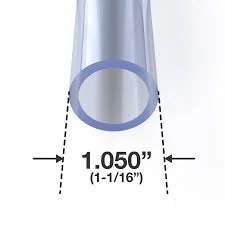Aug . 13, 2024 13:42 Back to list
Understanding the Benefits and Applications of PVC Drain Pipes in Modern Plumbing Systems
Understanding PVC Drain Pipe An Essential Component in Modern Plumbing
Polyvinyl chloride (PVC) is one of the most widely used materials in plumbing systems today, particularly in the form of PVC drain pipes. Known for their durability, lightweight nature, and resistance to corrosion, PVC pipes have revolutionized the way we approach drainage and waste management in both residential and commercial settings.
What is PVC Drain Pipe?
PVC drain pipes are plastic pipes made from polyvinyl chloride, a synthetic polymer that is known for its strength and durability. These pipes are primarily used for the transportation of wastewater from drainage systems. Their smooth interiors reduce friction, enhancing the flow of liquids and preventing clogs. Available in various diameters, PVC pipes can accommodate different drainage needs, making them versatile for numerous applications.
Advantages of PVC Drain Pipes
One of the most significant advantages of PVC drain pipes is their resistance to corrosion. Unlike metal pipes that can rust or degrade over time when exposed to moisture, PVC pipes maintain their structural integrity, ensuring a longer lifespan. This longevity translates to lower maintenance and replacement costs over time.
In addition to their corrosion resistance, PVC pipes are lightweight. This feature makes them easier to handle and install, which can reduce labor costs on plumbing projects. Furthermore, the ease of modification allows plumbers to cut and join them effortlessly, contributing to a more efficient installation process.
Another critical aspect of PVC is its resistance to chemical damage. Many substances found in household waste, such as cleaning agents and other chemicals, can deteriorate metal pipes over time. PVC pipes, however, can endure exposure to various chemicals without risking damage, making them suitable for drainage systems in kitchens, bathrooms, and industrial settings.
pvc drain pipe

Environmental Considerations
While PVC pipes offer numerous practical benefits, the environmental impact of their production and disposal must be considered. The manufacturing process of PVC generates harmful dioxins, and disposing of PVC pipes can contribute to plastic pollution. However, many manufacturers are now working towards more sustainable practices and recycling options. As a consumer, selecting products made from recycled PVC or opting for companies that prioritize eco-friendly production methods can help mitigate these environmental concerns.
Applications of PVC Drain Pipes
PVC drain pipes are found in several applications within residential, commercial, and agricultural sectors. In homes, they are commonly used in wastewater drainage, venting systems, and even in rainwater harvesting systems. In commercial settings, larger diameter PVC pipes manage significant volumes of wastewater effectively, while in agricultural practices, they are employed for irrigation and drainage systems.
Due to the versatility of PVC, innovative uses are continually emerging. For instance, in some regions, PVC pipes are being adapted for use in green technologies, such as urban drainage systems designed to reduce flooding and manage stormwater efficiently.
Conclusion
In conclusion, PVC drain pipes are an indispensable component of modern plumbing systems. Their resistance to corrosion, lightweight nature, and adaptability make them a preferred choice for various drainage applications. While environmental concerns surrounding their production and disposal are valid, advancements in sustainability efforts can help address these issues. By understanding the advantages and applications of PVC drain pipes, homeowners and builders can make informed choices, ensuring efficient and effective plumbing solutions for years to come.
-
High-Quality PPR Pipes and Fittings Durable ERA PPR & PVC PPR Solutions
NewsJul.08,2025
-
Black HDPE Cutting Board - Durable, Non-Porous & Food Safe HDPE Plastic Cutting Board
NewsJul.08,2025
-
High-Quality CPVC Panel Durable HDPE & PVC Panels Supplier
NewsJul.08,2025
-
Double PE Welding Rod Supplier - High Strength, Durable & Versatile Welding Solutions
NewsJul.07,2025
-
High-Quality PVC-O Pipe Supplier Durable 75mm PVC Pipe & Connections Leading PVC Pipe Company
NewsJul.07,2025
-
HDPE Drainage Pipe Supplier – Durable & Corrosion-Resistant Solutions
NewsJul.06,2025

